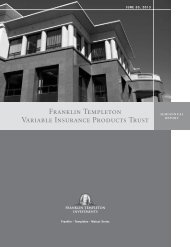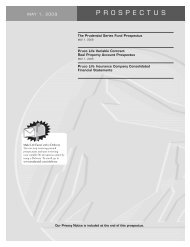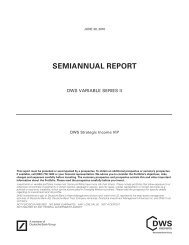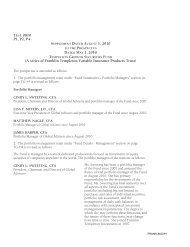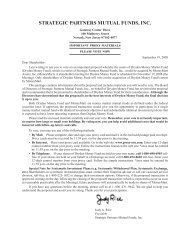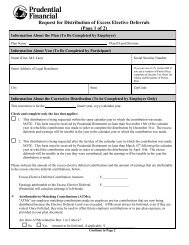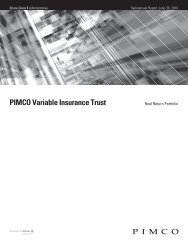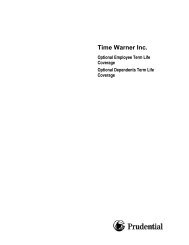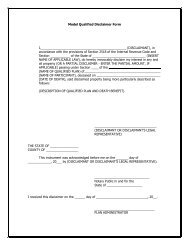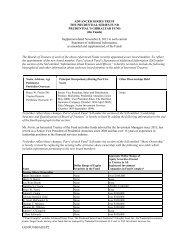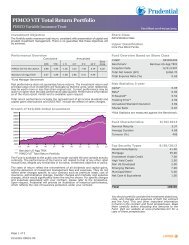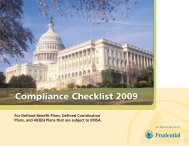Prudential Premier Retirement Variable Annuities
Prudential Premier Retirement Variable Annuities
Prudential Premier Retirement Variable Annuities
Create successful ePaper yourself
Turn your PDF publications into a flip-book with our unique Google optimized e-Paper software.
You may not have to pay the 10% additional tax discussed in this section in the following situations:<br />
▪ You have reached age 59 1 ⁄2.<br />
▪ You have unreimbursed medical expense that are more than 7.5% of your adjusted gross income.<br />
▪ The distributions are not more than the cost of your medical insurance if you are unemployed and certain requirements<br />
are met.<br />
▪ You are disabled within the meaning of Code section 72(m)(7).<br />
▪ You are receiving distributions that are part of a series of substantially equal periodic payments.<br />
▪ The distributions are not more than your qualified higher education expenses for yourself or other qualified individual.<br />
▪ You use the distributions to buy, build, or rebuild a first home (subject to a $10,000 lifetime limit).<br />
▪ The distribution is due to an IRS levy of the qualified plan.<br />
▪ The owner of the Roth IRA is deceased and you are the Beneficiary.<br />
▪ The distribution is a qualified reservist distribution.<br />
Excess contribution excise tax – An excise tax of 6 percent is imposed upon any excess contribution you make to your Roth IRA.<br />
This tax will apply each year in which an excess remains in your Roth IRA. An excess contribution is any contribution amount<br />
which exceeds your contribution limit, excluding amounts properly and timely rolled over from a Roth IRA or properly converted<br />
from a traditional IRA. Contribution limits are discussed above, in the section entitled “Contribution Limits.”<br />
Excess accumulation excise tax – One of the requirements listed above is your designated Beneficiary(ies) must take certain<br />
required minimum distributions after your death. An excise tax of 50 percent is imposed on the amount of any required minimum<br />
distribution which should have been taken but was not.<br />
Penalty reporting – You must file Form 5329 with the Internal Revenue Service to report and remit any additional or excise taxes.<br />
Miscellaneous<br />
Commingling Assets – The assets of your Roth IRA cannot be commingled with other property except in a common trust fund or<br />
common investment fund.<br />
Life Insurance – No portion of your Roth IRA may be invested in life insurance contracts.<br />
Collectibles – You may not invest the assets of your Roth IRA in collectibles (within the meaning of Code Section 409(m)). A<br />
collectible is defined as any work of art, rug or antique, metal or gem, stamp or coin, alcoholic beverage, or other tangible personal<br />
property specified by the Internal Revenue Service. However, specially minted United States gold and silver bullion coins and<br />
certain gold, silver, platinum or palladium bullion (as described in Code Section 408(m)(3)) are also permitted as Roth<br />
IRA investments.<br />
No required minimum distributions – As the owner of your Roth IRA, you are not required to take required minimum distributions<br />
from the Roth IRA commencing at age 70 1 ⁄2 during your lifetime (as is required for traditional, SEP and SIMPLE IRAs).<br />
Estate and gift taxes – Any amount held in your Roth IRA upon your death may be subject to estate taxes. Transfers of your Roth<br />
IRA assets to a Beneficiary during your life may be subject to gift taxes.<br />
Special tax treatment – Capital gains treatment and the favorable ten year forward averaging tax authorized in certain<br />
circumstances by IRC Section 402 do not apply to Roth IRA distributions.<br />
Prohibited Transactions – If you or your Beneficiary engage in a prohibited transaction with your Roth IRA, as described in IRC<br />
Section 4975, your Roth IRA will lose its tax-exempt status and you or your Beneficiary must generally include the value of the<br />
earnings in your account in your gross income for that taxable year. If you borrow money against your Roth IRA Annuity, you<br />
must include in your gross income the fair market value of the earnings in the Annuity as of the first day of your tax year. If you<br />
use part of your Roth IRA as security for a loan, that part is treated as a distribution and may be includible in your gross income. In<br />
both cases you may have to pay the 10% additional tax on early distributions, discussed above.<br />
IRS Approval<br />
Your Annuity contract or one substantially the same in form and certain riders, endorsements, amendments or schedules made a<br />
part of it have been submitted to the Internal Revenue Service for approval as to form for use as a Roth IRA. The Internal Revenue<br />
Service approval is a determination as to form only and does not represent a determination of the merits of this Annuity. Approval<br />
of the Annuity by the IRS has either been received or is pending. Please contact the Company with any questions regarding IRS<br />
approval. This Disclosure Statement and the Roth IRA Endorsement do not constitute a prototype, master plan or other document<br />
approved as to form or otherwise by the IRS.<br />
This disclosure is not part of the Prospectus.



